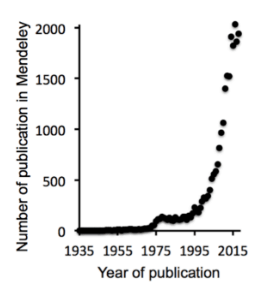A Gentle Reminder to Take a Pause – Revised
This Teaching Tip has been revised from the original version for off-campus options.
A default answer to ‘How are you?’ is often currently ‘Busy!’. In addition to forces beyond our control, we take on so much right now and sometimes feel overwhelmed as a result. This year has been unsettling for most of us on some level and many of our workloads have expanded and evolved in unforeseen ways. As we head into the winter months, it might be a good time to take a moment for a self-check on how we are dealing with things. It might also be a great time to remember to make time to pause from all the things we are doing, for the sake of our own wellbeing.
There are many strategies out there for helping us feel more in control of our time and a plethora of apps exist to help us manage multitasking, stay organized, track screen use, improve sleep hygiene, etc. But what about simply allowing yourself an occasional mindful break during the workday to take a breath – resisting the temptation to fill that ‘break’ with digital connectivity (e.g. scrolling through the news or social media)? This could be the first step toward re-focusing our time in a meaningful and restorative way.
Transformative and interdisciplinary (public health, neuroscience, psychology) biomedical research on meditation and human wellbeing, including studies of university students, is rapidly increasing nationally and internationally (Fig. 1). Many of these studies conclude meditation promotes well-being and can decrease anxiety and depression.

A default answer to ‘How are you?’ is often currently ‘Busy!’. In addition to forces beyond our control, we take on so much right now and sometimes feel overwhelmed as a result. This year has been unsettling for most of us on some level and many of our workloads have expanded and evolved in unforeseen ways. As we head into the winter months, it might be a good time to take a moment for a self-check on how we are dealing with things. It might also be a great time to remember to make time to pause from all the things we are doing, for the sake of our own wellbeing.
There are many strategies and apps out there for helping us feel more in control of our time and a plethora of apps exist to help us manage multitasking, stay organized, track screen use, improve sleep hygiene, etc. But what about simply allowing yourself an occasional mindful break during the workday to take a breath – resisting the temptation to fill that ‘break’ with digital connectivity (e.g. scrolling through the news or social media)? This could be the first step toward re-focusing our time in a meaningful and restorative way.
Transformative and interdisciplinary (public health, neuroscience, psychology) biomedical research on meditation and human wellbeing, including studies of university students, is rapidly increasing nationally and internationally (Fig. 1). Many of these studies conclude meditation promotes well-being and can decrease anxiety and depression.
“It’s really easy and helps you learn more about Google Docs and how to make them accessible. This tool gives you the tricks of the trade to get it right the first time.”
Finding space for pause while working remotely
Meditation
‘the Well’ – is a newly created space promoting the Science and Practice of Happiness and Wellbeing, which includes free, 30-minute, group meditation sessions Monday-Friday starting at 1:10 pm. Join the virtual daily meditation session here.
The Well welcomes beginners, drop-ins, as well as those that already have a meditation practice. This group meditation practice provides an opportunity to hone meditation skills that can be transferred to anywhere and anytime. For example, in moments sitting quietly, waking up, before your online class begins or before you are about to make a presentation or take an exam.
Art Gazing
Looking at art can be therapeutic! While the Student Art Gallery and UA Museum of the North are closed, why not take a virtual tour of famous galleries around the world:
- Google Arts & Culture – with works from 2,000 museums
- Walk slowly through the Hermitage
- Where have you always wanted to go? 2,500 more links to virtual museums here.
Quiet Contemplation
Find a space where you can be quiet or listen to soothing music. Clear your mind and focus on doing something that you enjoy. Perhaps you want to think about your summer garden, plant starters, play an instrument, brush your dog or cat, or simply go for a walk (or snowshoe) in the fresh air. Whatever it is, remember to relax and breathe and enjoy just doing.
Just for a while, detach from reading current events, take a break from social media, turn off your text notifications so you can refocus on something you love doing completely without distraction. Take some time and refocus on just breathing and the simple task at hand.
- UAF Alaska Master Gardener class blog – for inspiration on gardening
- Find walking trails near your location
- Fairbanks Public Library – wander the stacks virtually and then check something out (digitally or via curbside pickup)
Create
Take a 5-minute create break. Making art can also be therapeutic. Don’t worry about quality, spend the whole time on it, embellishing as much as time allows and then put it away. Repeat 1-2 times a day.
- Write – Write about the first thing that comes to you or use a word prompt.
- Draw – I like to use sticky notes. Draw the first thing that comes into your mind or use a sentence or phrase prompt.
- Play – if you play an instrument, find a space and noodle. (side note – an inspiring story of students in quarantine making music together)
Move
Being productive at work requires occasionally getting up and moving our bodies throughout the day. Consider integrating movement into your daily practice by setting calendar reminders. Try yoga in a new space (outside with snow pants on?), taichi, desk stretches, burpees, 5 minute workouts, exercise with your kids, or your dog. This article has links to a lot of great ideas.
My personal goal, starting now, is to answer the question ‘How are you?’ with ‘Wonderful – I just… [took a walk in the woods; drew a picture of a silly face; listened to some birds chirping; etc]’ instead of saying ‘Busy! or Worried!’ I hope you join me!
p.s. During this time of uncertainty, it is natural to feel overwhelmed, but please do reach out to your health provider if it gets too much or if you are feeling ill.
Further Reading
- Meditation 101 from Happify
- Buddha’s Brain – Neuroplasticity and Meditation
- Mind of the Meditator ($)
- Viewing art gives the same pleasure as being in love
- Digital Minimalism: Choosing a Focused Life in a Noisy World
- There is no work-life balance, just life balance
- Teaching Tip: Support students basic needs
Dr. Matthew Wooler
Mat Wooller is a professor of Marine Biology in CFOS and a researcher in INE. He is also a meditation teacher and coordinates ‘the Well’ – a place on the UAF campus devoted to promoting wellbeing.





This is wonderful! Thank you.